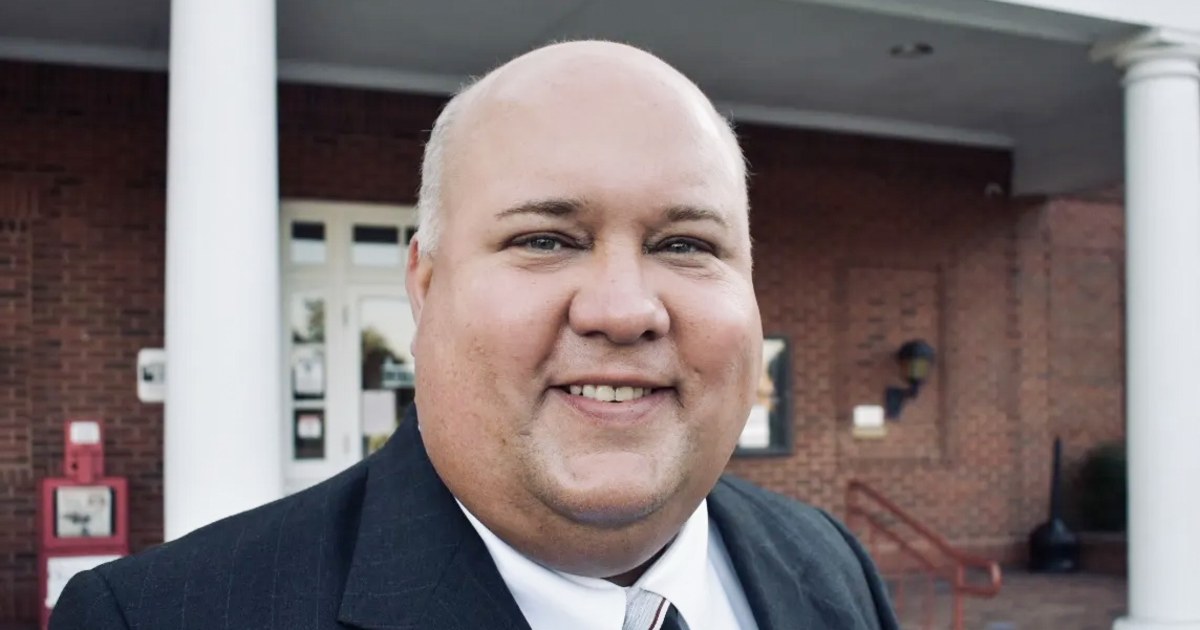
The apparent suicide of an Alabama pastor and mayor last week underscores the potential dangers of outing, or revealing a person’s real or perceived sexual orientation or gender identity against their will.
F.L. “Bubba” Copeland — the mayor of Smiths Station, Alabama, and a pastor at First Baptist Church Phenix City — died by apparent suicide on Friday. His death came two days after 1819 News, a conservative Alabama news site, published pictures of him wearing women’s clothing and makeup, and the same day the site published a follow-up article stating that Copeland wrote and shared a violent fictional story online featuring a woman he knew in real life and posted photos of minors and women online without their consent.
The photos published in the first article are from various social media accounts Copeland operated under the pseudonym Brittini Blaire Summerlin. In a screenshot of one of the since-deleted accounts, Brittini is described as a “transitioning transgender” girl.
In that article, the Alabama outlet stated that Copeland confirmed he operated the accounts and was featured in the photos, but said the accounts were merely about “getting rid of stress” and were just a “hobby” and a “fantasy.” The article also noted that Copeland deleted the accounts after the interview and asked that the 1819 News not make the screenshots of the accounts public due to his family and position as a pastor. That request was denied. Copeland, 49, was found dead two days after the Nov. 1 publication.
Following the article’s publication, Copeland addressed his congregation during a prayer service and spoke about being “the object of an internet attack.” In his remarks, which were recorded and posted to his church’s YouTube page, Copeland said he took photos with his wife in the privacy of their home “in an attempt at humor, because I know I’m not a handsome man or beautiful woman either.”
“I apologize for any embarrassment caused by my private personal life that has become public,” he said. “This will not cause my life to change. This will not waver my devotion to my family, serving my city, serving my church. I’m thankful for the grace of God and the willingness to forgive. I have nothing to be ashamed of. A lot of things that were said were taken out of context. In conclusion, I love my family. They’re number one. And, again, I’m sorry for what my actions have caused.”
Copeland thanked the hundreds of people he said had reached out to him in love and asked his congregation to turn their Bibles to the Psalm of David, which includes the line, “Even though I walk through the valley of the shadow of death, I will fear no evil, for he’s always close beside me.”
In his interview with 1819 News, Copeland referred to his online presence as “dress-up” and “cosplay,” though it is unclear exactly how he identified. People who cross-dress are not necessarily transgender or gay, but they often face anti-LGBTQ biases because they present or dress differently than their birth gender.
Regardless of how he identified, Copeland’s online persona was revealed without his consent, a practice called “outing” within the LGBTQ community. While it’s impossible to know exactly why someone attempts suicide or dies from it, the practice of outing, or even just the threat of it, can have severe negative psychological effects on the person who is outed, according to mental health experts. Stories of public outing can also have a ripple effect by discouraging people from coming out in the future.
The potential shame of a ‘secret life’
1819 News, the conservative website that published photos of Copeland’s online profiles, described his activity as a “secret life.” Among the social media photos the outlet shared were revealing images that appeared to show Copeland wearing women’s underwear. In a short article about Copeland’s death, 1819 News referenced its Nov. 1 and Nov. 3 articles, saying Copeland had been the subject of previous stories on the site regarding “his sexually explicit behavior” while serving as a mayor and a pastor.
Someone in Copeland’s situation would likely feel ashamed, embarrassed, humiliated and terrified, according to Dr. Jack Drescher, a clinical professor of psychiatry at Columbia University and the author of “Psychoanalytic Therapy and the Gay Man.”
Drescher noted that he can’t comment on the psychological frame of someone he hasn’t examined, but he described outing as an “act of violence” that could have severe negative psychological effects.
“People hide because they are afraid to be seen, and often if they are revealed over their own wishes and without their consent, it’s a form of violence, which is why you sometimes see violent responses,” Drescher said. “This is a violent response to an outing.”
Drescher said people often have good reasons for keeping their identities a secret, and often it’s because they don’t feel like they would be accepted. The dangers of revealing that information can vary, for example, if someone lives in a more conservative area.
Copeland’s position as mayor, and the news coverage of his death, could also affect people going forward, Drescher said, and could lead people who are keeping their identities a secret to feel more threatened.
The history of outing public officials
Over the last few decades, the outing of public officials has become rare, in part due to increasing acceptance of LGBTQ people and more awareness about the potential harms of outing.
However, outing has a long history both in and outside of elected and government offices. From the late 1940s to the ‘60s, thousands of federal employees were forced to resign because they were thought to be gay. The purge, which came to be called the Lavender Scare, was part of U.S. Sen. Joseph McCarthy’s effort to find and remove employees with suspected communist ties from the U.S. government. The name comes from the color lavender being associated with homosexuality.
LGBTQ historian Lillian Faderman, author of “The Gay Revolution” and several other queer history titles, said there are many examples of the harms of outing — or the threat of it — in American politics.
She pointed to former Sen. Lester Hunt, a Wyoming Democrat who was elected in 1948. In 1953, Hunt’s 25-year-old son was arrested for soliciting an undercover police officer in Washington, D.C., and two of McCarthy’s Senate Republican colleagues told Hunt that if he didn’t end his term and announce he wouldn’t seek re-election, they would make his son’s arrest a key campaign issue and publicize it widely, according to the Senate archives. In June 1954, Hunt announced that he wouldn’t seek re-election, and then, a few days later, died by suicide in his Senate office.
Faderman also gave the example of Andrew Ference, an administrative assistant at the U.S. Embassy in Paris who had a very promising future in the State Department. In the summer of 1954, Ference was interrogated by two State Department officials until he admitted to having a relationship with his male roommate. He was forced to resign from his position and died by suicide days later.
Faderman said some journalists would out elected officials who were secretly gay but were known for being anti-LGBTQ. For example, in 2007, Roll Call published a story about how then-Sen. Larry Craig, an Idaho Republican, was arrested for indecent behavior in a men’s restroom in the Minneapolis-St. Paul International Airport. He pleaded guilty to a charge of disorderly conduct. In that case, Faderman said, the outing seemed more justified because Craig’s views were hurting a community that he was allegedly a part of.
Outing has also had deadly effects outside of government. For example, in 2010, Rutgers University freshman Tyler Clementi, who was out as gay only to close family and friends, died by suicide after his roomate secretly recorded him having a romantic encounter with a man. In 2014, Essay Anne Vanderbilt died by suicide after a Grantland reporter found out she was trans and lied about her credentials in the course of reporting on a golf club she had built.
Faderman said the culture has changed significantly since the Lavender Scare, and nowadays the effects of being outed as gay would often be much less severe. However, Copeland’s apparent suicide shows the consequences may still be deadly, though the exact reasons for his apparent suicide are unknown.
“Nowadays, presumably, we’re safe being outed, unless we have to hide it for one reason or another, like we live in a small town, and we’re mayor or we’re a Baptist pastor,” Faderman said. “The irony is it’s no longer threatening to be outed unless you have something to lose, as this man did.”
If you or someone you know is in crisis, call or text 988 to reach the Suicide and Crisis Lifeline or chat live at 988lifeline.org. You can also visit SpeakingOfSuicide.com/resources for additional support.




